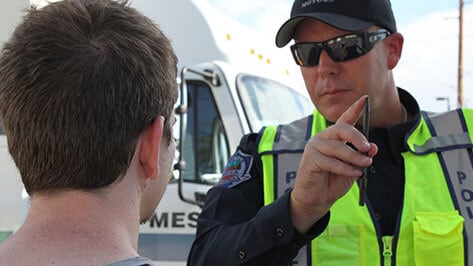
DUI checkpoints function as a general purpose investigatory tactic whereby police can get a close look at passing drivers by detaining them briefly. A roadblock DUI checkpoint is quick, but it gives police a chance to check tags and licenses, while also giving officers a quick whiff of the driver’s breath and a chance to view inside the vehicle for a moment. While this type of random stop may seem unconstitutional at first blush, both the United States Supreme Court and the Oklahoma courts have upheld the validity in certain circumstances.
In the federal case challenging the constitutionality of DUI checkpoints, the Supreme Court ultimately held that states have a “substantial government interest” to take measures to stop drunk driving, and that the DUI checkpoint technique was rationally related to achieving that goal.[1] The Court held that a brief delay and questioning to gain “reasonable suspicion” had a negligible impact on the drivers’ Fourth Amendment right from unreasonable search. Applying a balancing test, the Court found that the Constitutionality of the search weighed in favor of the government.
The Oklahoma Court of Civil Appeals addressed the constitutionality of DUI checkpoints in Geopfert v. State ex rel. Dept of Public Safety.[2] In Geopfert, the Moore Police Department conducted a roadblock in Moore, Oklahoma on New Year’s Eve, for the sole purpose of checking drivers for DUI. At a routine stop, an officer observed evidence of intoxication in Geopfert. The officer asked him to pull over and at that time he was given a field sobriety test. He was arrested and had a blood alcohol content of .13. Geopfert appealed the administrative DPS suspension of his license alleging the DUI checkpoint was unconstitutional. The trial court applied the Supreme Court’s balancing test laid out in Sitz, and ruled the DUI checkpoint to be valid under the Constitution. The Court of Civil Appeals affirmed the trial court’s ruling based on the facts and method in which the DUI checkpoint was conducted. The local paper advised its readers of the checkpoint. the Department put up signs warning motorists of the roadblock. The motorists were not detained if the officers did not detect any sign of alcohol use. The stops lasted approximately ten to fifteen seconds, whereas, the approved delay in Sitz was 25 seconds. The roadblock was successful in removing some intoxicated drivers from the New Year’s traffic and the officer did not arrest Geopfert until he observed Geopfert was intoxicated.
In summary, whether a DUI checkpoint in Oklahoma is constitutional would be determined by a court based on all the factors surrounding the stops. However, if officers carry out a DUI checkpoint as the Moore Police Department did in Geopfert, it is likely a court would uphold the stop.
If you have questions regarding a DUI arrest, a DPS license suspension, or DUI checkpoint in Oklahoma, contact our Tulsa DUI attorney at (918) 216-9644 for a consultation.
[1] Michigan Dept. of State Police v. Sitz, 496 U.S. 444 (1990).
[2] Geopfert v. State ex. rel Dept of Public Safety, 1994 OK CIV APP 142.

About the Author Carlos Williams & Associates, PLLC is a firm that services the Oklahoma community.
Over the years, we have demonstrated our skills and expertise as a leading single
source for legal support throughout Oklahoma. Request A Consultation